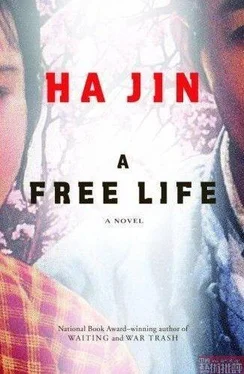He set out before daybreak on Monday, September 22, and drove northwest along I-75 and then switched to I-24. He enjoyed driving through the mountains and forests in Tennessee, but Kentucky was a bit too flat to him, although the cruise was smooth and pleasant, there being little traffic. Now and then a shower blurred the view of farmsteads-the corn, soybean, and tobacco fields, some of which had just been cut, were a dappled brown. At some places kudzu had engulfed abandoned farmhouses, shacks, and barns. Nan disliked this kind of lush vegetation because it suggested there were snakes and animals lurking in it. He often missed the forests in the North, which had a sparse undergrowth. Toward evening, a fog began gathering and even obscured the road signs along the way, so he got off I-57 and checked into the Thrifty Inn at Mt. Vernon, Illinois. The motel was in a three-story brick building, its rooms having wide windows. A plump woman at the front desk gave Nan a clean, comfortable room on the top floor, which was five dollars cheaper than those below. Nan cooked himself noodle soup for dinner and ate it directly from the pot, with a jar of kimchee, while watching a CNN interview with a blue-helmeted general of the U.S. peacekeeping force in Bosnia. After a hot shower, he went to bed and slept nine hours on end.
He didn't make breakfast the next morning and just ate two chocolate cookies and drank a large mug of coffee provided by the motel in its lobby around the clock. He set off rather late, after eight, because there were only about four hundred miles left.
It was a fine day and the farmland was dark, loamy, and boundless. The land was so flat that even the sky seemed lower than the day before. At one place a swarm of windmills was scattered among prairie grass like a flock of giant birds in flight. Nan especially enjoyed seeing the corn and soybean fields, in some of which combines were rolling, often accompanied by trucks. He was amazed to see cascades of the kernels pour into the backs of the trucks directly so that the farmers wouldn't have to do threshing and winnowing afterward. He had seen harvesters of a less advanced type back in the northeast of China, but they had all been owned by the state farms, each of which consisted of at least five hundred people. In contrast, here every individual family used such a machine.
Pulling up on the roadside, Nan stepped out of his car and sat down on the grass to watch a combine reaping corn. The sight touched him as he remembered that in middle school the students of his grade had once gone to the countryside to help the peasants gather in crops. After all the ears of corn in a field had been plucked off by hand the previous day, each of his grade-mates took charge of a row and sickled down the plants, which the villagers would peel and use the skins to weave mats. How tedious and backbreaking that work was! Within two hours most of them began to complain of backaches and had blisters on their hands, yet they had to continue for a whole day to finish cutting that field of corn plants. By comparison, here the combines shredded the stalks and left them in the fields to fertilize the soil. Furthermore, a regular-size field here, much larger than those in China, could be harvested by two people in just a few hours. As Nan was observing the rolling machines and remembering how human labor had been wasted back in China, tears welled in his eyes and blurred his vision. He wished he could tarry longer to watch the harvesting some more.
The vast land was so sparsely populated that occasionally it looked desolate. Some farmsteads were decayed-the red barns with gam-brel roofs, the silos topped with silver domes, and even the white farmhouses seemed to have fallen into disrepair, though beyond them meadows were dotted with fresh hay bundles and with milk cows grazing indolently. Nan couldn't help but wonder how lonesome those farmers living far away from the highways must have felt, especially in the wintertime when they were snowed in.
He didn't reach Iowa City till six p.m. as a result of an accident near Davenport -an eighteen-wheeler sideswiped a pickup and caused a standstill on the highway. Without difficulty he found Dick's apartment in a brick building with a mansard roof. Dick was relieved to see that Nan had arrived safely. He had to moderate a students' reading that evening, and Nan was too exhausted to go with him. Instead, Nan took a shower, then cooked himself a simple meal. After dinner, he looked through Dick's collection of poetry books, most of them hardbacks, which filled four tall bookcases. Dick also had hundreds of CDs and DVDs, some of which were Hong Kong kung fu movies. Nan was fascinated but too tired to go through all the disks stacked against the wall. He made his bed on the long sofa in the study and lay down to sleep, having left the floor lamp on.
A frost fell that night, and the city was blazingly bright the next morning, the warm sun shining on the streets, roofs, electrical wires, and trees, though the sidewalks were plastered with wet leaves. Nan loved the cool weather and took a walk in the bracing air. Dick didn't accompany him because he had to prepare for the afternoon poetry workshop and would have meetings the whole morning. Nan enjoyed seeing a few white houses with red roofs, red jalousies, and red porches, as if they were gigantic toys. Passing a small pond, he came upon some yellow lotus flowers, which he had never seen before and which, though wilting, delighted him. A few lotus pads were as big as coffee tables. And with a flashing plop, a tiny fish skipped out, disappeared, and left behind expanding ripples. Strolling on such a fall morning in this midwestern town, he felt rejuvenated and full of expectations, as if he were a graduate student again. The dark soil of the roadside fields smelled familiar and brought Manchuria back to his mind. Now and then one or two cyclists passing by would greet him heartily or give him a cheerful nod.
Early in the afternoon he went to Dick's workshop. He found the Creative Writing Program easily, in a white wooden colonial on North Clinton Street, its shutters, windows, doors, and eaves all blackish green. Before its front entrance stood a young oak and around the house were maples, their leaves showing their pale undersides whenever a wind ruffled them. The interior of the house was much nicer than its exterior, with fine woodwork and a few stained-glass windows. The seminar room was in the back of the first floor, and Nan went in without saying a word to anyone. Sitting against a wall, he quietly observed the students seated around two large tables pushed together. At the other side of the room stood a tall metal cabinet. Dick didn't introduce Nan to the class and just mentioned they had a visitor today, then he went ahead to conduct the workshop. Behind him two chalkboards hung on the wall; one of them still bore three lines left by a past class illustrating the metrical pattern, marked with alliterative ticks. Nan liked the ambience of the seminar, which was cozy and informal. Most of the aspiring poets were smart and articulate, full of nervous energy, but he wasn't impressed by the poems being discussed, which were too light and too arty to him. One piece addressed the speaker's own breasts as a pair of little friends, and another was about the palatal sensations produced by mint chocolate.
These beginning writers seemed quite fragile and seemed to be writing poetry mainly for themselves or for an elite readership. True, they argued heatedly with reddened cheeks, flashing eyes, and sly smirks, but the passion seemed to have originated more from personal feelings and the obsession with linguistic devices than from the love for ideas and deep emotions. To a degree, poetry had become an esoteric art here, somewhat deprived of its vitality and earnestness. It was hard for Nan to imagine fitting in such a group. He was afraid they might laugh at his ineptitude for English and attack him where he was weak.
Читать дальше












